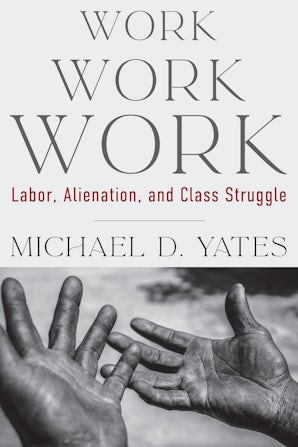Finding your class bearings in a leftwing universe (Work Work Work reviewed in ‘Morning Star’)

Work Work Work:
Labor, Alienation, and
Class Struggle
by Michael D. Yates
216 pages / 978-1-58367-965-4 / $19
Reviewed by Gavin O’Toole
In the complex landscape of late-stage capitalism, the multiple forms taken by the division of labour can blind us to our shared status of “working class.”
On every page of Work Work Work, Michael Yates puts us right, reminding us that work, whatever form it takes — manufacturing, farming, bureaucracy, services or gig — is exploitation based on the extraction of surplus value, and that only by undoing capitalism can we end that.
This book is an impassioned restatement of Marxist principles with an educational ambition: the author wants his readers to awaken to the alienation that characterises “work” and comprehend the processes that cause it.
It is an understandable ambition given Yates’s background teaching workers and labour activists throughout the US. He cannot conceal a lifetime’s yearning to foster consciousness in a class indoctrinated at every turn by delusions of individual self-interest.
It also feels timely at a moment in which the cruel drubbing of workers by crises not of their making is waking up so many from their long neoliberal nightmare to the power of collective action, with trade unions at last showing signs of rediscovering their strike power.
Accordingly, Yates’s first target is the “bold lie” stuffed down the throats of students of neoclassical theory, which invents “labour markets” that function like cogs in a make-believe, rational and timelessly efficient economic machine that we all know simply does not exist.
Among the fallacies he draws attention to are wages that do not rise with productivity, the threat to the equilibrium posed by minimum salaries, and the existence of unemployment which neoclassical theory implies should be impossible in a market economy.
At the same time, he is scathing of liberal economists such as Joseph Stiglitz who, despite their talk of fairness, cannot imagine a society that is not fundamentally capitalist.
Yates writes: “Markets act as a veil, hiding the face of the system … isn’t it obvious that markets benefit those who have the most money, and there never has been and never will be a capitalist system in which money is not unevenly distributed?”
He proceeds to remind us, employing examples primarily from the Americas, that capitalism is, by definition, built upon the exploitation of wage labour in which most toil is soul-destroying drudgery to line the pockets of someone else.
This makes antagonism between workers and owners fundamental, and in turn explains the sophisticated mechanisms of control and surveillance used by capitalism to stop workers exercising collective, class power. Yates cites Amazon’s warehouse practices as a classic example of the “panopticon” deployed to constrain worker behaviour.
The combined effects upon workers of this manipulation and the religious observance of individualism are endemic inequality, insecurity, fear, and lack of confidence — ultimately generating resentment and rage.
However, capitalism also generates divisions within the working class itself, most obviously through systemic racism and patriarchy, and the author dismisses any socialist arguments resistant to efforts to give these vices special, targeted attention.
In the same vein, he is as critical of social-democratic utopianism as he is of sell-out trade unions that co-operate with management.
Crises of recent years, from the financial meltdown to environmental destruction and the pandemic, have exposed the fault-lines of capitalism like never before, making radical change urgent — and impossible within the confines of market socialism.
After a lifetime of activism, Yates is that rare thing: a defiantly unreconstructed Marxist faithful to self-evident truths whose enthusiasm for prosecuting working-class struggle with every weapon at our disposal is undimmed….
Read the full review at Morning Star


